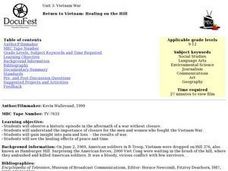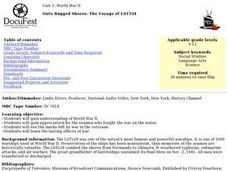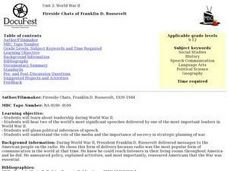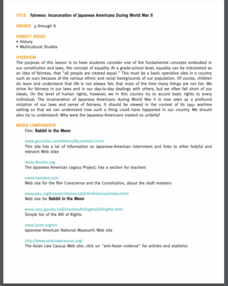Curated OER
Return to Vietnam: Healing on the Hill
Young scholars view a film about soldiers returning to Vietnam years after the war. They discover the need of closure by the soldiers because the war was not won. They examine the results of the war and answer questions to complete the...
Curated OER
Chicago Rhythms, Chicago Roots
Students view a video about different types of music. They examine the history of jazz, big band and rock back to the city of Chicago. They discover Chicago's music scene today and compare it to the past.
Curated OER
Colors of Gray
Students view a film about theatres in Chicago. They discover how performing arts can be enjoyed by all ages and how one becomes involved in performing in theatre. They answer questions and discuss to end the lesson.
Curated OER
Outo Rugged Shores: The Voyage of LST534
Young scholars view a film about warships during World War II. They discover the job of a seaman and what impact veterens have on the world today. They also examine the lasting effects of the war.
Curated OER
Fireside Chats of Franklin D. Roosevelt
Students view a film about Franklin D. Roosevelt and his fireside chats. THey identify political inferences in his speeches and how the media played an important role in the war. They answer questions to complete the lesson.
Curated OER
Fairness: Incarceration of Japanese Americans During World War II
Young scholars examine fairness in relation to the incarceration of Japanese Americans during WWII. In this equality instructional activity, students watch a video "Rabbit in the Moon" and discuss what happened to the Japanese Americans...
Curated OER
How Things Fly
Students observe photographs of selected twentieth-century aircraft at the National Air and Space Museum and note differences in the design of aircraft wings, fuselages, and engines.
Curated OER
I Had To Tell This Story
Tenth graders analyze the video "Berga: Soldiers of Another War." In this World History lesson, 10th graders read a quote and discuss the meaning of the quote. Students read and answer questions based on a video
Curated OER
Tintin and I: Primary and Secondary Sources
Mickey Mouse, Elmo, and Tintin? Belgian cartoonist Georges (Herge) Remi’s famous comic character launches a study of primary and secondary source material and the impact these sources have on storytelling. Class members also examine the...
J. Paul Getty Trust
Picturing a Story: Photo Essay about a Community, Event or Issue
Picture this. Class members follow in the footsteps of W. Eugene Smith, Dorothea Lange, James Nachtwey, and Lewis Hine by creating their own photo essay about a local event or issue.
Curated OER
The Transit in Pictures
Students investigate the June 2004 Transit of Venus, write a screen play, and produce a movie or animation of the transit including a narration. The difference between storytelling and storyboarding is made clear in this lesson plan.
Curated OER
Portraits, Pears, and Perfect Landscapes: Investigating Genre in the Visual Arts
Students define genre in the visual arts, particularly in Western painting and explain the differences between subject and genre. The genre of a variety of works of art is identified.
Curated OER
Portraits, Pears, And Perfect Landscapes: Investigating Genre in the Visual Arts
Differentiate between the various genres in the visual arts world, particularly in Western painting. Your class can view and discuss, in small groups, paintings published on the National Galleries website. Then each student individually...
Curated OER
Jazz in America Lesson Plan 7
The student will explore free jazz, fusion, and contemporary jazz. They will listen to avant garde, fusion, and pop recordings. In addition, they participate in a class discussion regarding jazz's contribution to and reflection of...
Curated OER
PASSENGER PIGEONS: NOMADS LOST
Middle schoolers explore the concept and implications of extinction using the example of the Passenger Pigeon, once an extremely abundant species that was completely eliminated by humans.
Curated OER
Entertaining Vancouver's Youth During World War II.
Learners investigate relevant period documents and artifacts and have the
opportunity to replicate a 1943-44 entertainment experience by viewing a program
of World War II era motion pictures on site at Vancouver's historic...
Curated OER
No Food, No Money, No Job: What to Do?
Students explore the concept of philanthropy. In this service learning lesson, students research the Civilian Conservation Corps and create an advertisement that might have promoted it.
Curated OER
Jazz in America
Eleventh graders explore Jazz in America. They examine greats in Jazz, such as Duke Ellington. They are also to discuss the cultural implications of the music itself.
Curated OER
What Do We Learn From the Repartiation of Alaska Native Artifacts?
Students observe and evaluate evidence of Alaska Native cultural symbols and artifacts. They research historical data from a variety of primary resources, including the Harriman expedition journals, related web sites, oral accounts,...
Curated OER
A Neighborhood Expedition
Students plan and conduct an expedition through their neighborhood based on the techniques used by the Harriman Expedition to Alaska in 1899. They research the Harriman expedition on the internet and then create a route and collection...
Curated OER
Harriman and Plant Identification
Students observe and record botanical details from the plant specimens. They identify plants using sorting key and field guide and classify specimens for preservation and display purposes.
Curated OER
Can We Be Both Conservationists and Consumers?
High schoolers explore their role as consumers and conservationists and what roles they play in today's economic climate. They explore resource allocation issues. Students analyze data and draw comparisons between historical and...
Curated OER
How Has Transportation Changed Since the 1899 Harriman Alaska Expedition?
Students recognize modes of transportation. They research historical data from a variety of primary and secondary sources including the Harriman expedition journals, related web sites, and photographs from the expedition. Students...
Curated OER
Learning About Location: Charting the Path of the George W. Elder
Students acquire a working knowledge of the geographical concepts: absolute location, relative location, longitude and latitude. They analyze primary sources that shows the physical and human characteristics of the places along the 1899...

























